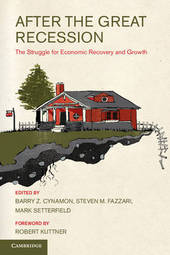
|
After the Great Recession: The Struggle for Economic Recovery and Growth
Hardback
Main Details
| Title |
After the Great Recession: The Struggle for Economic Recovery and Growth
|
| Authors and Contributors |
Edited by Barry Z. Cynamon
|
|
Edited by Steven Fazzari
|
|
Edited by Mark Setterfield
|
|
Foreword by Robert Kuttner
|
| Physical Properties |
| Format:Hardback | | Pages:354 | | Dimensions(mm): Height 235,Width 157 |
|
| Category/Genre | Economics
Macroeconomics
International economics |
|---|
| ISBN/Barcode |
9781107015890
|
| Classifications | Dewey:338.9009051 |
|---|
| Audience | | Professional & Vocational | |
|---|
| Illustrations |
15 Tables, unspecified; 19 Line drawings, unspecified
|
|
Publishing Details |
| Publisher |
Cambridge University Press
|
| Imprint |
Cambridge University Press
|
| Publication Date |
30 November 2012 |
| Publication Country |
United Kingdom
|
Description
The severity of the Great Recession and the subsequent stagnation caught many economists by surprise. But a group of Keynesian scholars warned for some years that strong forces were leading the US toward a deep, persistent downturn. This book collects essays about these events from prominent macroeconomists who developed a perspective that predicted the broad outline and many specific aspects of the crisis. From this point of view, the recovery of employment and revival of strong growth requires more than short-term monetary easing and temporary fiscal stimulus. Economists and policy makers need to explore how the process of demand formation failed after 2007 and where demand will come from going forward. Successive chapters address the sources and dynamics of demand, the distribution and growth of wages, the structure of finance and challenges from globalization, and inform recommendations for monetary and fiscal policies to achieve a more efficient and equitable society.
Author Biography
Barry Cynamon is a Research Associate at the Weidenbaum Center on the Economy, Government and Public Policy at the Washington University, St Louis. His early research on the US consumer age of the past quarter century linked rising household spending and debt to group interactions and cultural norms. This work was published in 2008, just as the 'risk of collapse' it identified played out to become known as the Great Recession. He has also published research on both monetary and fiscal policy and is Chief Financial Officer of GLC Investments, a renewable energy investment management firm. He holds an MBA from the University of Chicago. Steven Fazzari is Professor of Economics and Associate Director of the Weidenbaum Center on the Economy, Government and Public Policy at Washington University, St Louis. He received a Ph.D. in economics from Stanford University in 1982. The author of more than forty peer-reviewed journal articles and book chapters, Professor Fazzari's research explores two main areas: the financial determinants of investment and R&D spending by US firms and the foundations of Keynesian macroeconomics. His teaching awards include the 2002 Missouri Governor's award for excellence in university teaching, the 2007 Emerson Award for teaching excellence and Washington University's distinguished faculty award, also in 2007. Mark Setterfield is Professor of Economics at Trinity College, Hartford, Associate Member of the Cambridge Centre for Economic and Public Policy at the University of Cambridge, and Senior Research Associate at the International Economic Policy Institute, Laurentian University, Canada. He is the author of Rapid Growth and Relative Decline: Modelling Macroeconomic Dynamics with Hysteresis, the editor (or co-editor) of six volumes of essays, and has published on macroeconomic dynamics and Keynesian macroeconomics in journals including the Cambridge Journal of Economics, European Economic Review, the Journal of Post Keynesian Economics and The Manchester School.
Reviews'It has come as a shock to some that decades of relative economic stability could end with the calamity of the Great Recession and continued economic stagnation. Yet, many economists did see the writing on the wall, warning us that decades of productivity gains outstripping wage growth and increased reliance on debt and complicated and increasingly risky financial instruments were a recipe for disaster. The authors in this volume lay out the paths that policy makers could take that would deliver good jobs and sustained economic stability. This time, we should seriously consider their advice.' Heather Boushey, Senior Economist, Center for American Progress 'After the Great Recession is an outstanding collection of essays by some of the most insightful economists working in the United States today. The real-world significance of this volume stands in stark contrast to the failures of virtually all orthodox economists to either understand the causes of the recession or offer viable solutions for ending it or preventing similar disasters in the future. This book deserves careful study and a wide professional readership.' Robert Pollin, Co-Director, Political Economy Research Institute, University of Massachusetts, Amherst 'This is the definitive statement from the fragile financial sector wing of post-Keynesian economists as to why we should be deeply pessimistic about where the economy is and where it is likely to remain.' Eugene Smolensky, University of California, Berkeley
|